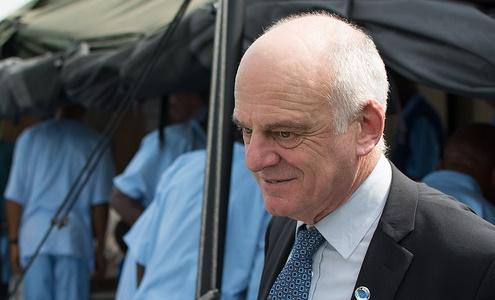An expert panel appointed in July to review what World Health Organization (WHO) emergency reforms are needed in light of gaps revealed by the Ebola outbreak recently released its initial findings, which recommend a separate entity within the WHO to handle both outbreaks and emergencies.
WHO Director-General Margaret Chan, MD, MPH, last spring suggested a small, focused review committee to specifically look at what reforms are needed for how the organization responds to outbreaks and emergencies, which was well received by the World Health Assembly when it met in May.
Chan appointed the 19-member committee on Jul 21 with David Nabarro, MD, the United Nations' special Ebola representative, as its chair. In the lead-up to its first report, the committee met four times by teleconference and once in person for 2 days in late October.
The group's Nov 15 report includes initial findings and a set of recommendations, some of them asking for immediate action from Chan. It will release a second report when it concludes its work.
Restructuring, more independence requested
Among its main observations, the committee said that, for the WHO to fulfill its mandate, it must balance decisive leadership with being a supporting partner to national authorities and other international groups.
Panel members emphasized that independence and impartiality in the WHO's mandate and among its staff should be much more explicit in its work and external communications.
The experts made several recommendations, which included expanding the current emergency response framework to include all phases of the management cycle, from preparedness to prevention. They said the WHO needs to quickly develop the capabilities it needs for leadership and outbreak and emergency response support, adding that such efforts will require political commitments from member states.
A centerpiece of their recommendations is the immediate establishment of a global Program for Outbreaks and Emergency Management, which would bring all of the WHO outbreak and emergency functions—from headquarters to regional—under one umbrella.
The unit would also house departments that work on risk analysis and assessment under the International Health Regulations. The new program would also have a dedicated platform to provide operational and logistical support for community and country preparedness and response.
The committee recommended that the outbreak and emergency program be headed by an executive director who reports directly to the director-general and should receive both steady funding and have access to a contingency fund. The experts stipulated that the new program have an independent oversight body to monitor its performance according to pre-established benchmarks.
Panel members also weighed in on recommendations for WHO collaborations. For example, they recommended that the agency lead independent and comprehensive risk assessments that include alert levels.
Next steps
At a media briefing yesterday, Nabarro said Chan has accepted the group's recommendations, according to an Associated Press (AP) report today.
The group has three more teleconference meetings planned before the end of the year, then a second in-person meeting slated for early January.
Nabarro's group is one of several review efforts undertaken in the wake of West Africa's Ebola outbreak. Another key review from an independent panel convened by Harvard University and the London School of Hygiene and Tropical Medicine (LSHTM)—will be released on Nov 23.
See also:
Nov 15 Review committee initial report on WHO outbreak and emergency response reforms
Nov 19 AP story
Jul 31 CIDRAP News story "WHO Ebola-related emergency response reforms advance"
Background on Harvard-LSHTM review on global Ebola response





















